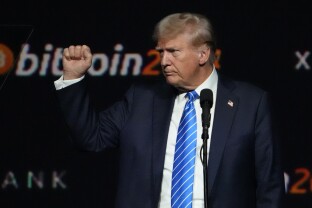The crypto industry spent more than $180 million on elections since the beginning of 2023 — more than any other special interest in this cycle — and now they’re awaiting a legislative payout, possibly before Donald Trump takes office.
Crypto has turned itself into the new Big Oil in town by financial electoral might, even if not by actual might, lawmakers across the aisle agreed. Even without any changes yet, crypto investors’ wallets are already bulging over the possibility of an industry-friendly government. The price of Bitcoin climbed above $100,000 for the first time last Thursday.
“The crypto industry is still a fledgling industry. If you compare it to oil, natural gas, it’s still a fledgling industry,” Republican Rep. Byron Donalds, crypto supporter, and part of the House’s digital assets subcommittee, told NOTUS.
“I didn’t say that just because they’re fledgling, they ain’t got no money,” Donalds added, pointing to the industry’s potential. “The resources are there. The market caps can be trillions of dollars.”
One of the industry-funded PACs, Defend American Jobs, spent $40 million in a successful attempt to oust the chair of the Senate Banking Committee, and crypto skeptic, Democratic Sen. Sherrod Brown.
“Interest groups,” Brown told NOTUS in his final weeks at the Capitol, “have struck it rich with this new administration, this special interest Congress.”
The $172 million in election spending by Fairshake, one of the other crypto-funded PACs, was surpassed only by Kamala Harris- and Trump-affiliated PACs and the two parties’ own major fundraising arms, according to Federal Election Commission data.
Co-founder of the crypto company Gemini, Cameron Winklevoss, celebrated Brown’s loss, writing on X on Election Day, “This is what happens when you mess with the crypto army.”
Compared to other established special interests, crypto’s level of direct corporate spending and bipartisan endorsements — particularly from such a recent industry — is unprecedented, according to campaign finance watchers.
Unlike the traditional post-Citizens United corporate method of dumping funds into dark money groups that don’t have to disclose their contributors, crypto industry funding was mostly public (even if the ads the PACs funded for their chosen candidates often didn’t mention crypto anywhere in them).
“It was legal before, but they really kind of shattered the norm against big companies spending directly in elections,” Rick Claypool of the watchdog group Public Citizen told NOTUS.
The crypto trading platform Coinbase put about $70 million directly into Fairshake, campaign finance records show.
The industry can “use a ton of money to create this crypto-shaped club that they’re holding over candidates, and that changed candidate behavior,” Claypool argued, pointing to the House-approved FIT21 Act.
The industry-backed bill moves some regulatory oversight over crypto under the less well-financed Commodity Futures Trading Commission instead of the aggressive Securities and Exchange Commission.
Former Democratic Rep. Jamaal Bowman, for example, was among the 136 “no” votes on the bill during the May vote. Three weeks later, Fairshake made a $2 million ad buy against him. Fairshake PAC did not respond to a request for comment.
A coalition representing crypto companies issued a letter to Trump and Congress last Friday laying out its top five priorities, stating, “Following a historic election, the crypto industry is hopeful and optimistic for a friendlier regulatory environment.”
The highly visible “crypto-sized club” — out in the open and looming over lawmakers staring down their next election — also grants some legitimacy in Washington for an industry plagued by fraud, scandal and most notably, the collapse of Sam Bankman-Fried’s crypto exchange, FTX, two years ago.
“It showed people around here that they are established, embedded and frustrated with the status quo,” Republican Sen. Cynthia Lummis, a crypto advocate, told NOTUS. “They’ve earned the attention of both parties.”
Lummis is pushing for elements of FIT21 to pass in the lame-duck session post-crypto funds avalanche. She said her hope in pushing it now — before the next, likely crypto-friendlier Congress — is to keep the issue from becoming only a mantle of the right. “I think it’s advantageous to the industry to try to prevent this from being a one-party-only industry.”
There’s not a strong likelihood of crypto being a priority for Senate Majority Leader Chuck Schumer, according to Mark Hays, a crypto skeptic and senior policy analyst at Americans for Financial Reform. That’s partly because Republicans want to put their stamp on the issue with their new governing trifecta.
“The crypto industry, despite their claims to sort of transforming finance, seems to have kind of perfected the age-old strategy of Washington, pay-to-play politics,” Hays said. “Which is to dump millions of dollars into elections to secure an outcome that is favorable to them.”
He predicted tension between the push for industry-friendly legislation and flying under the radar now that Trump won and has promised to replace the crypto-skeptical regulator Gary Gensler at the SEC with a friendlier head.
But crypto skeptics heading into the 119th Congress are facing down a Republican trifecta and 276 “pro-crypto candidates,” according to the group Stand With Crypto, which grades lawmakers by how industry-aligned their votes are.
“They are going to expect a big return on their investment,” Sen. Elizabeth Warren, graded with an F by Stand With Crypto, told NOTUS. “Like all big-dollar donors who think that their money should buy them a seat at the table.”
Correction: A previous version of this story double counted a portion of crypto industry PAC spending.
—
Claire Heddles is a NOTUS reporter and an Allbritton Journalism Institute fellow.
Sign in
Log into your free account with your email. Don’t have one?
Check your email for a one-time code.
We sent a 4-digit code to . Enter the pin to confirm your account.
New code will be available in 1:00
Let’s try this again.
We encountered an error with the passcode sent to . Please reenter your email.


